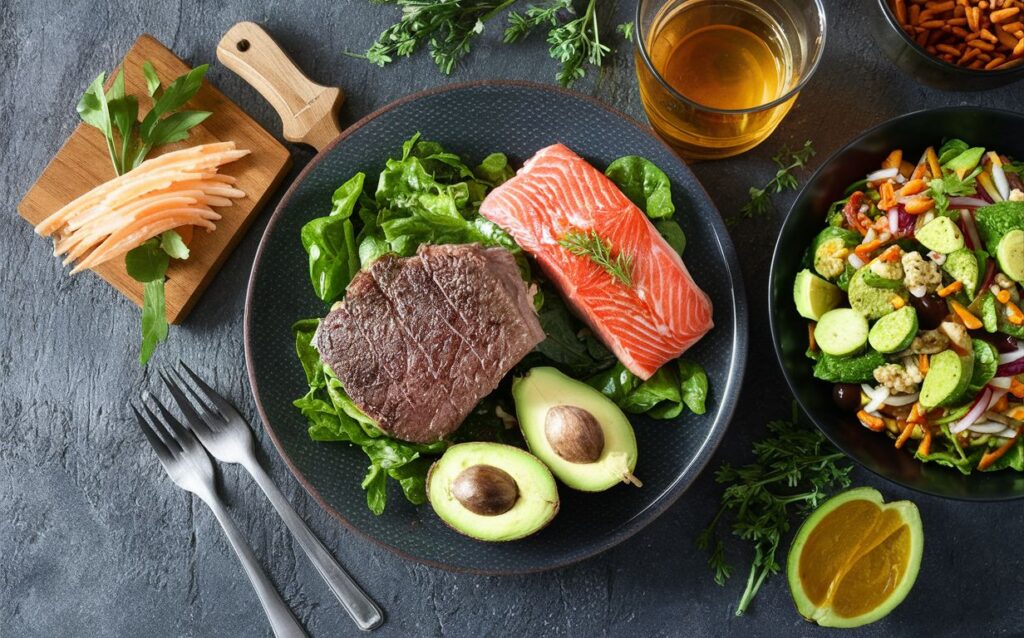Table of Contents
Introduction
The keto diet is a low-carb, high-fat diet that has been shown to have a number of health benefits. These benefits include weight loss, improved blood sugar control, and reduced risk of heart disease. The keto diet works by forcing the body to burn fat for fuel instead of glucose. This is because when you eat a low-carb diet, your body produces ketones, which are molecules that can be used for energy. Ketones are produced when the liver breaks down fat. The keto diet is not for everyone, and it is important to talk to your doctor before starting the diet. However, for those who are healthy and able to follow the diet, the keto diet can be a very effective way to improve their health.
In this article, we will discuss the keto diet in more detail. We will cover what the keto diet is, how it works, what foods are allowed on the diet, and what the potential benefits and risks are. We will also provide tips for beginners on the keto diet.
What is the keto diet?
The keto diet, also known as the ketogenic diet, is a low-carb, high-fat diet that has been shown to have a number of health benefits. The diet is based on the principle of ketosis, which is a metabolic state in which the body burns fat for fuel instead of carbohydrates.
When you eat a ketogenic diet, your body produces ketones, which are molecules that are produced when the body breaks down fat. Ketones can provide energy for the brain and other organs, and they can also help to suppress appetite.
The keto diet has been shown to be effective for weight loss, improving blood sugar control, and reducing inflammation. It may also be beneficial for treating certain conditions, such as epilepsy, cancer, and Alzheimer’s disease.
However, the keto diet is not for everyone. It can be difficult to follow, and it can also lead to side effects such as fatigue, nausea, and constipation. If you are considering trying the keto diet, it is important to talk to your doctor first.
Benefits of the keto diet
The keto diet is a high-fat, low-carb diet that has been shown to have a number of benefits for weight loss, blood sugar control, and overall health. Some of the benefits of the keto diet include:
- Weight loss
- Improved blood sugar control
- Reduced inflammation
- Improved cholesterol levels
- Increased energy levels
- Better sleep
- Improved mood
It is important to note that the keto diet is not for everyone. Some people may experience side effects such as fatigue, nausea, and constipation when they first start the diet. It is important to talk to your doctor before starting the keto diet to make sure it is right for you.
How to follow the keto diet
The keto diet is a low-carb, high-fat diet that has been shown to have many health benefits. It can help you lose weight, improve your blood sugar control, and reduce your risk of heart disease.
To follow the keto diet, you need to eat a diet that is very low in carbs and high in fat. This means that you should avoid sugary foods, processed foods, and grains. Instead, you should focus on eating whole foods, such as meat, fish, eggs, vegetables, and healthy fats.
The keto diet is a very restrictive diet, and it can be difficult to follow in the beginning. However, if you stick with it, you will eventually start to feel the benefits.
Here are some tips for following the keto diet:
- Start slowly. Don’t try to cut out all carbs at once. Gradually reduce your carb intake over a period of weeks or months.
- Find keto-friendly foods that you enjoy. There are many delicious keto foods available, so you don’t have to eat bland food.
- Stay hydrated. Drinking plenty of water can help you avoid the keto flu.
- Get enough electrolytes. Electrolytes are minerals that help your body function properly. You can get electrolytes from food or supplements.
- Be patient. It takes time for your body to adapt to the keto diet. Don’t get discouraged if you don’t see results immediately.
If you are considering following the keto diet, talk to your doctor first. The keto diet is not suitable for everyone, and it can have some side effects. Your doctor can help you determine if the keto diet is right for you.
Side effects of the keto diet
The keto diet can cause some side effects, including:
- Headaches
- Fatigue
- Nausea
- Diarrhea
- Constipation
- Increased thirst
- Muscle cramps
- Bad breath
These side effects are usually temporary and will go away within a few weeks as your body adjusts to the diet. However, if you experience any severe side effects, such as vomiting, dizziness, or abdominal pain, you should see your doctor.
The keto diet can also lead to dehydration, so it’s important to drink plenty of fluids, especially water.
In some cases, the keto diet can cause nutrient deficiencies, so it’s important to make sure you’re getting enough vitamins and minerals, especially potassium, magnesium, and calcium.
If you’re considering starting the keto diet, talk to your doctor first to make sure it’s right for you.
Tips for beginners on the keto diet
The keto diet can be a great way to lose weight and improve your health, but it can also be challenging to get started. Here are a few tips for beginners on the keto diet:
- Start slowly. Don’t try to cut out all carbs at once. Start by reducing your carb intake gradually, and gradually increase your fat intake.
- Find keto-friendly foods that you enjoy. There are many delicious keto-friendly foods available, so you don’t have to eat bland food on the keto diet.
- Stay hydrated. Drinking plenty of water is important on any diet, but it’s especially important on the keto diet because you may lose more water weight than you would on a traditional diet.
- Get enough electrolytes. Electrolytes are minerals that help your body function properly. You may need to supplement your electrolytes on the keto diet, especially if you’re experiencing side effects like fatigue or muscle cramps.
- Listen to your body. The keto diet is not for everyone. If you’re experiencing side effects that are making it difficult to stick to the diet, talk to your doctor.
FAQs about the keto diet
Here are some common questions about the keto diet and their answers:
- What are the benefits of the keto diet?
- What are the risks of the keto diet?
- What foods are allowed on the keto diet?
- What are some tips for beginners on the keto diet?
- How long does it take to see results on the keto diet?
- What happens if I cheat on the keto diet?
- Is the keto diet safe for everyone?
- What are some other popular low-carb diets?
Conclusion
The keto diet is a low-carb, high-fat diet that has been shown to have a number of potential health benefits. These benefits include weight loss, improved blood sugar control, and reduced risk of heart disease. However, the keto diet is not without its risks, and it is important to speak with a doctor before starting the diet. If you are considering starting the keto diet, be sure to do your research and make sure that you are following the diet correctly. This will help you to avoid any potential risks and to get the most out of the diet. Here are some resources that you may find helpful: * [The Keto Diet: A Complete Guide](https://www.dietdoctor.com/ketogenic-diet) * [Keto Diet Resources](https://www.ketodietapp.com/) * [Keto Diet FAQs](https://www.healthline.com/nutrition/ketogenic-diet-101)
9. Resources
Here are some resources that you may find helpful:
- Diet Doctor – A comprehensive resource on the keto diet, including information on how to get started, recipes, and success stories.
- Keto Connect – A blog and YouTube channel dedicated to the keto diet, featuring recipes, tips, and advice from people who have been following the diet.
- Ruled Me – A blog and cookbook by popular keto author and chef, Mark Sisson.
- Keto Gains – A resource for people who want to use the keto diet to lose weight and build muscle.




